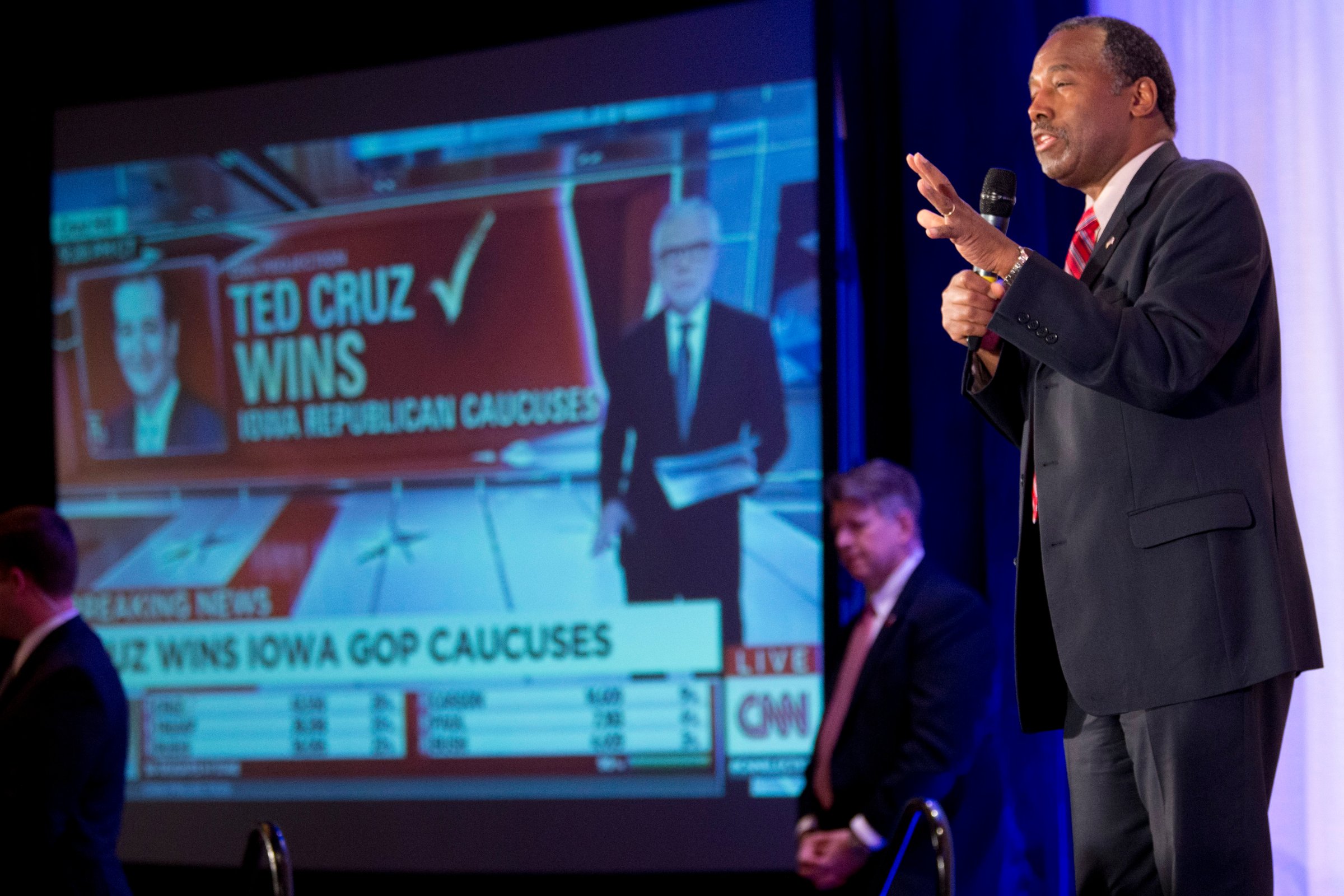
Ben Carson had a simple message for his supporters Monday: “I’m not going anywhere.”
After coming in a distant fourth in the Iowa caucuses behind Texas Senator Ted Cruz, businessman Donald Trump and Florida Senator Marco Rubio, the retired neurosurgeon struck a defiant note in a speech at a Des Moines hotel.
The cheering was somewhat tepid when campaign manager Ed Brookover asked the people in the crowd if they were pleased with the results of the night. It got louder when he asked if they wanted Carson to keep going.
“I’m not shocked,” supporter Matt Berndt, 33, said of Carson’s finish with just below 10% of the vote. “I am a little disappointed.”

Carson’s campaign projected positivity. “We’re very proud of Dr. Carson’s showing,” Brookover told reporters at the end of the night. “Few gave Dr. Carson’s campaign a chance to even be alive on Feb. 1 at the beginning of the Iowa caucuses. There were few that even thought he would be able to last until Labor Day, let alone the first of the year. Dr. Carson far surpassed those expectations.”
Rob Taylor, Iowa state representative and Carson’s state co-chair, added that Carson’s finish put him ahead of multiple current and former governors and two former winners of the Iowa caucus, Mike Huckabee and Rick Santorum.
The blight on the night for the Carson campaign was the allegation that Cruz’s team had deliberately spread rumors during the caucuses that Carson was dropping out. But Carson is determined to move forward.
“The latest set of dirty tricks just intensifies my desire to work extremely hard to break down the ugliness in this system,” he said.
Despite the Carson team’s projected confidence about the results, a fourth-place finish in Iowa is not what they had once hoped for. At one point, it even seemed possible that a win was within Carson’s grasp, as he was briefly at the top of the Iowa polls in November.
But after the terrorist attacks in Paris and San Bernardino, voters faded on him. The shootings didn’t lessen voter appetite for an outsider (Donald Trump climbed even higher in some polls), but they did increase the premium on fire-and-brimstone speeches, which are anathema to Carson’s languid demeanor.
“It hurts with some people … who think toughness is denoted by how loud your voice is and how loudly you stamp your feet,” Carson told reporters after an event in Iowa City on Jan. 29.
And his campaign knows it too. Jason Osborne, Carson’s deputy senior strategist, said that since the attacks, the campaign has focused on trying to beef up his foreign policy chops.
“We’ve been very intense in making sure that policy papers are out there, that we’re talking more policy, that he’s crisper in his answers,” Osborne told TIME. Carson has said he would formally wage war on the Islamic State, and at a recent campaign event at the University of Iowa, he encouraged attendees to read up on the history of Islam.
There have been stumbles in his efforts to seem strong on foreign policy, most famously when he repeatedly mispronounced Hamas to something that sounded more like hummus at the Republican Jewish Coalition forum in Washington, D.C., in December. Osborne was frustrated with all the media coverage of the gaffe: “He’s said [Hamas] multiple times before and after correctly, and then he just accentuated the wrong part of the word … We get attacked for that,” Osborne lamented.
Although on its face tonight’s result was not a disaster for the Carson team, this was one of the few early states where Carson was poised to be a top-tier contender. Most immediately, a RealClearPolitics poll average of New Hampshire voters has him at only 3.2%.
Still, Osborne says he thinks Carson could perform well in South Carolina, Nevada and some Southern states like Alabama and Georgia.
He says the campaign will likely stick with a similar strategy to the one they’ve been using recently in Iowa, emphasizing Carson’s views on foreign policy and attempting to get him in front of as many voters as possible (the campaign has recently started live-streaming most of his events).
“If we did well here based on what we’ve done over the last month directly, and then overall in that last several months, why change that aspect of it?” Osborne said before the caucus.
Osborne is hoping the main difference after tonight could be that Carson will earn more time in the press. “I think if we come in with a higher-than-expected number here from a media standpoint, then they’re going to help us with media,” Osborne said. “The reality is that all the candidates except for Trump are trying to compete for ads in the Super Bowl, and Trump controls the Super Bowl. How do you compete with that?”
Berndt, one of the supporters at Carson’s caucus party, says he’s still pulling for Carson but recognizes the drawback of his place in the caucus results. “I believe he’s a very strong candidate,” Berndt said. “But I believe his ability that’s lacking maybe to be the next President is to speak strongly and put fear in other people.”
More Must-Reads from TIME
- Why Trump’s Message Worked on Latino Men
- What Trump’s Win Could Mean for Housing
- The 100 Must-Read Books of 2024
- Sleep Doctors Share the 1 Tip That’s Changed Their Lives
- Column: Let’s Bring Back Romance
- What It’s Like to Have Long COVID As a Kid
- FX’s Say Nothing Is the Must-Watch Political Thriller of 2024
- Merle Bombardieri Is Helping People Make the Baby Decision
Write to Tessa Berenson Rogers at tessa.Rogers@time.com